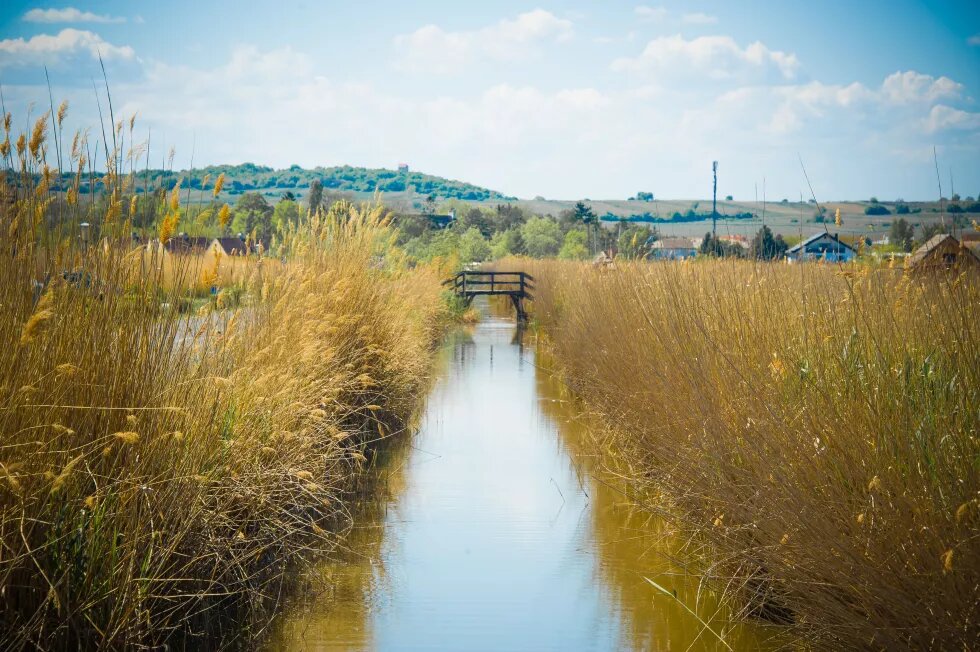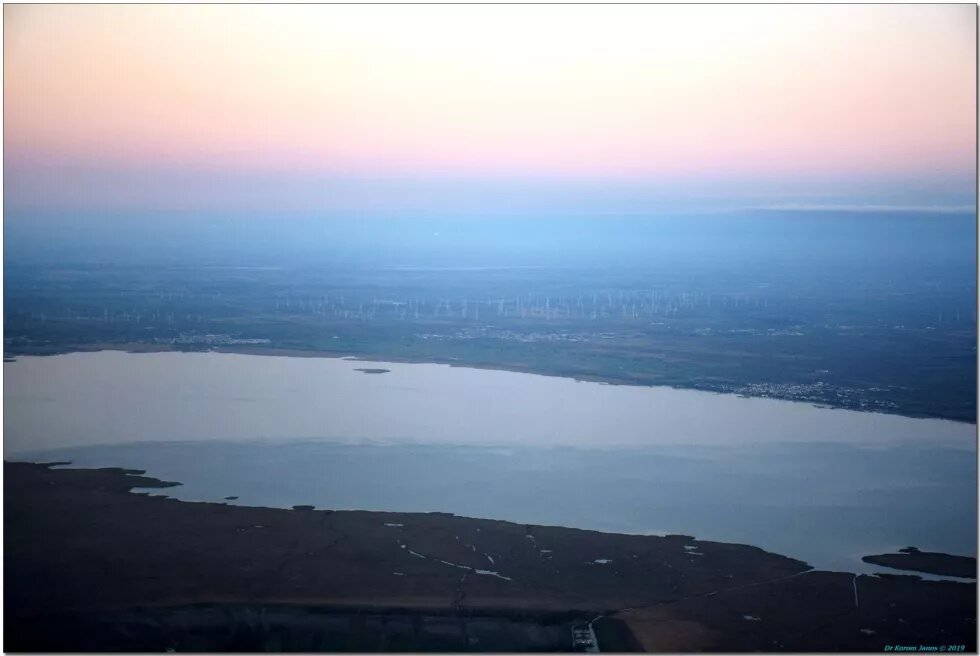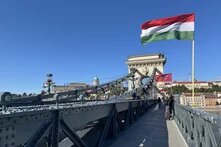
A growing number of public and private investments is posing enormous threats to Hungarian lakes.

Lake Balaton: If the current process continues, the beautiful lake might turn into a stinking mire
In 2000, the Hungarian Parliament adopted a law which ensured strict protection of Balaton, the biggest Central European lake. It set strict conditions for building development, regulated agricultural activities near the shore, made closed wastewater treatment compulsory, and intervened in every possible area to protect the water quality and ecosystem of the lake. However, in 2018, this legislation has been downgraded by the Parliament. Other legislative changes, such as amendments to the laws on the preparation and adoption of municipal plans, stimulated “developments” on a huge scale in the surroundings of Balaton.
In many places, housing estates, luxury hotels, and marinas are being built, blocking off campsites and open waterfronts that were previously used as beaches and public parks. These investments are mostly financed with EU money and/or by persons who have gotten rich from EU money. There are no assessments of the possible impacts of the investments, and the government agencies do not consider it necessary to examine the environmental, economic, and social impacts of the planned investments. The local governments, if they are asked at all, may express their opinion within an extremely short deadline, and local citizens are not. This can be done all the more because many of the investments (both public and private ones) are often classified as priority investments by the government. Moreover, the first step in the construction process is the toppling of trees and the destruction of reed beds, although their existence is vital for the lake’s ecosystem.
According to Ferenc Jordán, former director of the Balaton Limnological Research Institute, “the real estate investors at Lake Balaton are rejoicing, but by the time their five-star hotels are built, the whole lake could be a stinking mire”. (The government responded to the Institute’s increasingly alarming reports on the state of the lake by firing its director and partly dismantling the Institute.) Civil protests have broken out in a series of places along the shores of Balaton supported also by national NGOs. In 2019, the Alliance for Lake Balaton was founded to coordinate and help the grassroots communities fighting to save the lake. The Alliance also launched a petition demanding a halt to the destruction of the lake. The petition has been signed by nearly 90,000 persons which is an outstanding number in Hungary for a petition started by an NGO.
Neusiedler Lake: The Hungarian government ignores UNESCO and continues to destroy the world heritage site
The second biggest natural lake, Neusiedler Lake (Fertő Lake) is part of a transboundary UNESCO World Heritage (WH) site with the Neusiedlersee-Seewinkel National Park and it is also a UNESCO Man & Biosphere reserve and a Natura 2000 site protected by the EU Habitats and Birds Directive. The planned investment aims at spending roughly 94 million euros of public money for the construction of tourism facilities. The plans include 880 parking lots, a port for more than 450 yachts and another for more than 350 paddling boats, a four-star hotel right on the shore of the lake, and a big sporting complex with tennis courts. The total new artificial surface would be approximately 13 hectares. The construction work has already started and it is carried out mainly by a company of Lőrinc Mészáros, a childhood friend of Prime Minister Viktor Orbán who, during the last 11 years, has become from a gas fitter in a small village the richest person in Hungary – overwhelmingly from EU funded projects.
Civil society organisations and local citizens on both sides of the Austro-Hungarian border requested the Hungarian government to stop its investment which ignores the guidelines set up in the WH site’s management plan. The Hungarian National Committee of the International Council on Monuments and Sites (ICOMOS) criticised several elements of the project and requested the investor and the main architectural planner to refine the plans in its report dated on February 2021. This request was ignored, and then the UNESCO WH Secretariat, having consulted ICOMOS International, called on the Hungarian government to stop its investment. UNESCO did not receive any reply to date, and the project has continued with demolishing existing architectural properties within the core zone of the site and destroying important natural habitats.
Although Fertő Lake is part of an IUCN Category II national park, which – together with its Austrian sister park Neusiedlersee Seewinkel National Park – has been certified by the Europarc Federation as a best practice example of transboundary cooperation, there is no evidence available publicly that the planned investment has ever been discussed bilaterally. The Austrian Federal Minister for Environment and Climate requested its Hungarian partner to conduct a proper transboundary environmental impact assessment. This request was also ignored which is a violation of the rules of joint management of a transboundary WH site.
The design of the new tourism facilities, which has no overriding social or economic interest, thus ignores binding EU regulations. Therefore, a local citizen with the help of ClientEarth submitted an official complaint to the European Commission’s DG Environment. After the assessment of the complaint, the Commission started an EU Pilot investigation, which might lead to a legal infringement process. The European Parliament (EP) has also accepted a petition from the Friends of Fertő Lake Association.
On 25 November 2021, the investor published a public procurement call with a matter of urgency. The estimated value of the procurement is 26,5 billion HUF (almost 73 million EUR) and the deadline for submission was 17 December (i.e., the rather complex submission, which involves the construction of 12 big buildings, should have been prepared within 22 days). The call stated the following reason for the urgency: if there will be no construction work, animals might re-occupy the location.
More than 500 million Euros of EU funding are allocated to the Sopron area (which includes also the area of the Neusiedler Lake investment) for regional development. Although the government asserts that there is no EU funding involved in its investment at the lake, this is clearly only an accounting trick.
Lake Velencei: The site of one of the most wasteful and damaging EU-funded projects
The third biggest lake, Lake Velencei has already gained certain international attention in 2010 when it was listed as one of the 50 most wasteful EU-funded projects. It was not only wasteful but also very damaging to the ecosystem as trees were cut down and the semi-natural habitats were replaced with a shopping mall and other facilities on the shore. Since that time, constructions and preparations for new lakeside investments have continued unabated on the shores of the lake.
On the southern shore, the local government is reclassifying green areas immediately adjacent to the waterfront as mixed urban development areas and declaring them priority development areas, which will allow the construction of multi-storey buildings up to 30 metres from the lake. Although local residents disagreed with the proposed changes during the preliminary consultation and even the County Government Office has expressed its concerns, the new regulations are expected to be adopted soon. No prior impact assessments have been carried out and there has been no real involvement of citizens and civil society organisations in the process. On the north shore, the construction of a kayak and canoe centre is to be constructed by a business partner of the prime minister’s son-in-law, István Tiborcz. (In 2009, Tiborcz had only a small company with annual revenue of around 29,000 euros. After Viktor Orbán became prime minister in 2010, its revenues surged, and already in 2011, they reached nearly 10 million euros. Since then, Tiborcz has become one of the richest persons in Hungary – overwhelmingly from public orders funded with EU money.) In addition to the planned 19,000 square metres of net floor space, the centre would also house a handball, racquetball, football and two tennis courts, as well as a 66-room, 3-storey dormitory. A government decree classified the project as a priority investment with exceptionally permissive regulations on building density, building height, and the ratio of green areas.
Lake Öreg: The resting place of tens of thousands of birds threatened
Lake Öreg, Old Lake of Tata is a Natura 2000 area and a Wetland of International Importance as defined by the Ramsar Convention. A natural area on the lakeshore has been selected by Avalon, a subsidiary of Hell Energy Company, as a site for the construction of a five-star hotel. (This company has received generous European Union funding and Hungarian public money.) Under current local legislation, the planned hotel cannot be built on this property: it would require an increase of the permitted ratio of the built-up area, and it would pose a serious threat to the lake’s ecosystem. The road to be constructed to the hotel would also destroy natural areas, and the traffic on it would cause huge nuisance to the migratory birds.
Local citizens formed a coalition and collected more than 6500 signatures demanding a local referendum; the process, however, was interrupted by a government decree prohibiting local referendums during the pandemic. The local NGOs organised several demonstrations and other actions during which it became evident the vast majority of Tata’s residents oppose the project. The Hungarian National Committee of ICOMOS and several national NGOs (among others BirdLife Hungary, Greenpeace, and Clean Air Action Group) also voiced their concerns about the planned investment.
The grassroots movements of residents striving to protect the above-mentioned four lakes have recently formed the Great Lakes Coalition which is now supported also by several national NGOs. Twenty-one European NGOs, including ClientEarth, Friends of the Earth, Greenpeace, and Euronatur, have turned to Virginijus Sinkevičius, the European Commissioner for Environment, calling on the Commission to look into the disturbing developments concerning investments within and next to Natura 2000 sites encompassing Lake Balaton, Lake Fertő, Tata Old Lake and Lake Velence.
The author expresses his thanks to Angéla Badzsó (Összefogás a Balatonért Egyesület – Alliance for Lake Balaton), Zoltán Kun (Fertő tó Barátai Egyesület – Friends of Neusiedler Lake Association), Gábor Pongrácz (Alba Natura Alapítvány – Alba Natura Foundation), Ákos Szeidemann (Miénk a Grund Városvédő Egyesület – “The Land is Ours” Urban Protection Association, Tata), and Krisztina Németh (Nagy Tavak Koalíció – Great Lakes Coalition) for their valuable contribution to this article.




